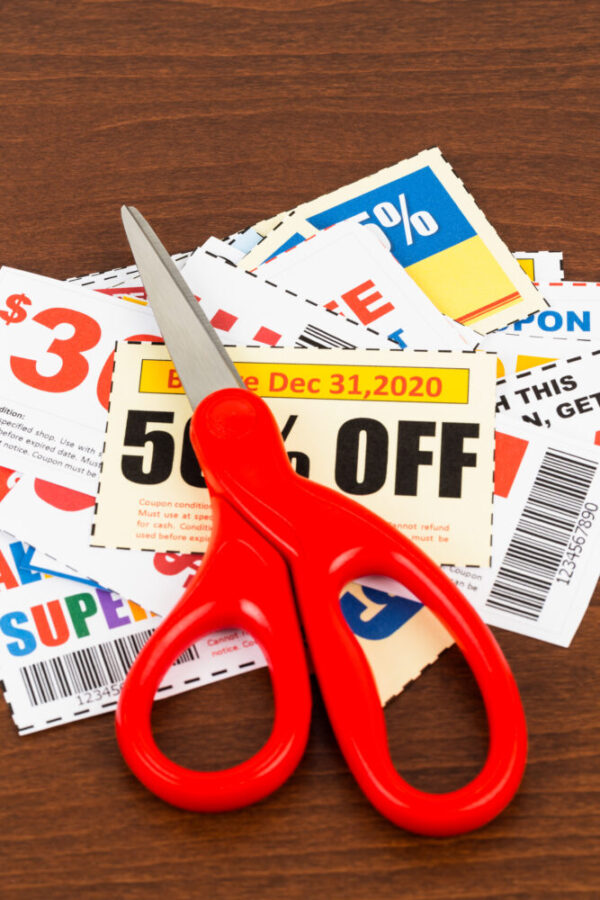Save Money
The Truth About Extreme Couponing

Lately I’ve been watching TLC’s new show, “Extreme Couponing” which is sort of like watching a train wreck. You know you should look away but you just can’t. The show profiles people who get hundreds or thousands of dollars worth of merchandise for free or close to it, thanks to their use of coupons.
This show has sprouted a lot of interest in couponing and many people are wondering how they can do this, too. The truth is, you probably can’t do extreme couponing. At least not on any sort of consistent basis. Real people who use coupons probably save anywhere between ten and fifty percent on their average shopping trips. This is great but it’s not the extreme shown on TV, which leads some to feel like they’re failing. You’re not failing. You’re normal. These people on TV are not normal. Here’s the truth about how they get those deals.
These are not normal shopping trips: There is a reason the word “extreme” appears in the title of the show. Many of these people have been planning their attacks for weeks. They aren’t going for the typical items like break, milk, or produce. They are buying things like boxed pasta, health and beauty aids, canned food, and other items that don’t expire. While it may look cool that they’ve saved all this money, this isn’t (or I hope it’s not) all that they feed their families. Off camera, they are probably making other trips to fill in with other items. They aren’t getting everything for free.
Some participants resort to fraud or actively circumvent/abuse store policies: The show profiled one woman who wanted to divide her order into multiple transactions to take advantage of the fact there her store was offering $10 off of every $50 purchase. She broke her huge order into multiple $50 transactions to further her savings. The manager came over and told her the policy was one discount per person. Since she had her husband with her, she was eligible for two discounts. Rather than be happy with that, they called all their friends to the store and made them each do a transaction. Is it legal? I suppose so since the manager didn’t complain (but then again he probably didn’t want to come across as mean on national TV). Is it within the spirit of the policy? No. Another woman is now suspected of engaging in coupon fraud. She used a convoluted process to exploit a technical flaw in the store’s computer system. There’s a good explanation of what she allegedly did here. If this is true, what she did is illegal. If you have to resort to cheating to get the savings, you haven’t saved anything.
They give couponers a bad name: These people are the reason why cashiers roll their eyes when you show up with your coupons. They take hours to check out and some are rude to cashiers who make mistakes or who don’t process their orders in exactly the right way. The ones who resort to fraud or sketchy practices are why cashiers and managers scrutinize every coupon you present and why some stores have stopped taking coupons altogether or have limited their doubling practices. At least now I know where some of the hostility toward coupon users I discussed last week comes from.
The show does not adequately track the “real savings”: Many of these people pay to get coupons from clipping services, or by buying multiple copies of the Sunday paper. Many are printing large quantities of online coupons. If you factor in ink and paper, each coupon may cost a few cents to print. One couple on the show carried supplemental insurance to the tune of $35,000 to insure their stockpile. The premium for that policy eats into the savings. One woman took a day off work to do her shopping trip. That’s either lost wages or lost vacation time. To be a true representation of the savings, all of these things would have to be accounted for.
These people live in areas with great coupon policies: Not every area has stores that double coupons or triple coupons. To get these kinds of savings, you have to have stores that multiply coupons. You also need to have stores that don’t limit the number of coupons you can use. For example, my stores here say that I can’t use more than five coupons for the same item in one transaction. Therefore, if I had ten coupons for the same brand of cereal, I’d have to make two trips. My stores double coupons, but only the first five. You also need a store that will let you make “overage” on coupons. That means that if the price of the item with coupon ends up being lower than the price of the item, that the store will apply the overage to the order. Many stores will simply cap the amount of the coupon at the price of the item, meaning you have no “overage” that reduces your bill for your non-sale items even further.
They are borderline hoarders: I don’t think it was coincidence that TLC’s other show, “Hoarders” aired right after “Extreme Couponing.” These people have stockpiles of stuff that they will never be able to use before it goes bad. Even things like deodorant will lose their effectiveness and toilet paper will start to degrade. Cereal will go bad. It may be great that you have two years worth of cereal, but unless you can eat all of it before the expiration date, it’s wasted. They have devoted whole rooms of their homes to their stockpiles, stuffed items under every bed and in the shower stalls, and stopped using their garages for cars to accommodate the piles of stuff. Stockpiling is fine, as long as you balance using your stock with replenishing it. Most of these people spend too much time adding to it and not enough time using it. They’ve sacrificed living space to service this addiction.
They dedicate a lot of time to this: One woman spent six hours in the store. She logged in to her computer first thing in the morning to look for deals and spent all day on the computer. She admitted to leaving family events early to go shopping. Others spend hours managing their stockpiles. At the very least, they spend hours collecting and organizing coupons and matching coupons to sales and then shopping and checking out with multiple carts full of stuff. This is a full time job for most of these people and for some, it’s an obsession. The time they spend allows them to get big savings, but most couponers don’t have the time or desire to devote this much time to this.
They eat a lot of processed food: There are coupons out there for healthy items, as I’ve discussed before. Not every coupon is for junk. However, these healthy coupons do not appear en masse every week. This is why you see many extreme couponers packing their carts with Ramen noodles, boxed mac and cheese, cereal, and jarred/canned food. You can use coupons and eat healthfully, but you will never get everything in your order for free. There just aren’t enough coupons for fresh produce, meat, and organic items. If that’s all you’re willing to eat, extreme couponing is never going to work for you.
So can you save with coupons? Yes, but probably not to this extreme. The most oft-quoted coupon strategies still apply. Match your coupons to the sale items and only use coupons for things you can and will actually use. You’ll save money. Maybe not the extreme that these people do, but you have to remember this is “reality TV” where things are often anything but real. Even if you can’t save hundreds of dollars, ten dollars saved is still ten dollars. You’re still doing well at couponing. Don’t fret if you can’t be like these people. Chances are, you don’t really want to be like them, anyway.
Read the full article here

-

 Side Hustles5 days ago
Side Hustles5 days agoThe Day Trader’s Guide to Making Money Without Tying to a Desk
-

 Side Hustles4 days ago
Side Hustles4 days agoHow Charlotte’s Rally Pickleball Got Its Start
-

 Make Money4 days ago
Make Money4 days ago5 Surprising Ways Trump’s Trade Agenda Could Affect What You Pay at Checkout
-

 Investing4 days ago
Investing4 days agoQuantum stock soars on new file system client By Investing.com
-

 Investing6 days ago
Investing6 days agoTrump signals potential reconsideration of TikTok ban By Investing.com
-

 Side Hustles2 days ago
Side Hustles2 days agoKickstart Your Year With These Entrepreneurial Health Checkups
-

 Passive Income5 days ago
Passive Income5 days agoHow Mission-Driven Leadership Fuels Growth in the Digital Era
-

 Passive Income4 days ago
Passive Income4 days ago7 Things You Need to Consider Before Expanding Your Business


















